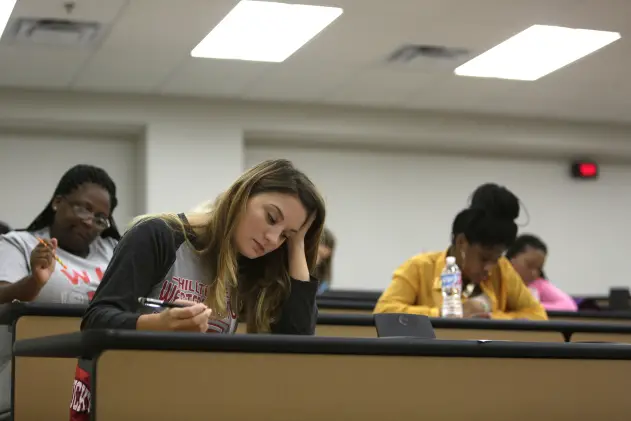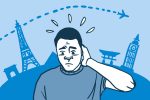Having an anxiety disorder is more than just feeling occasionally anxious at times. Read this to learn more about the different types of anxiety disorders, as the article goes into depth about six specific types of them, but, generally, anxiety tends to make you feel unhappy and scared a lot of the time.
The minute you’re having fun in life, anxiety will remind you of every way things could go wrong. But that doesn’t mean everyone with anxiety disorders must live harrowed, unfulfilled lives. I have been struggling with a few anxiety disorders my entire life, and as a college student, I still face my anxiety most days. But over the years, I’ve learned a few tricks to keep my anxiety from overtaking my entire world.
So, since college is a place where a lot of students experience anxiousness, here’s my list of tips that might help.
1. Have a plan for school work.
When you’re dealing with anxiety, your mind can easily run off in different directions and become overloaded with every little thing that’s happening in their life. One great way of calming down this particular symptom is planning for school, homework and any other work or activities that you may have in your life.

Write down all the times your classes take place and all the homework you receive from each class. This will help with being disciplined and getting school work done, while helping to rein in anxiety. Make sure that you have allotted a specific time to take care of every task, focusing at first on the most imminent challenges and then moving toward larger, farther-away projects.
Creating to-do lists helps as well, because school can feel overwhelming as a result of the different responsibilities it requires you to juggle. As a result, breaking down what feels like an impossible tangle of tasks into small, doable chores can be the difference between a break-down and a series of inspired trips to the library.
2. Communicate with teachers.
If you’re dealing with social anxiety, just going to school may be tough, since being around a lot of people can be overwhelming. As someone who has anxiety, I know that I have an irrational fear of failing, so I might not ask as many questions as I should. But, not asking questions can lead to feeling even more anxious since I don’t understand what is expected of me from teachers.
For anyone else who has a problem like asking for help, try to talk to your professors right at the beginning of each semester. By doing this, you build a relationship with the teacher and they won’t seem as intimidating. If a person with anxiety holds back and doesn’t ask for help, then the likelihood of ever asking for help decreases.
Anxious people know what it’s like to let their minds get the best of them. Once you have the comfort of knowing your teacher won’t crucify you for reaching out though, anxiety over school work and being inside the classroom can diminish.
3. Give your anxiety a name.
I call my anxiety a gargoyle because it can be ugly and digs its claws into my shoulders. By giving your anxiety a name, the distress in your mind becomes less abstract. Calling your anxiety Bob or Susan or any other name can help you address your problem by confronting it.
So, when you’re having trouble during a class or feeling anxious working on homework, call Susan out and see what happens. Even if you want to speak out loud to your anxiety, go for it (though perhaps not in class), but talking to Susan in your mind works just as well. Maybe Susan will ease up a little bit, and your anxiety will lessen some.
4. Sometimes, you have to cry before you can feel better.
Just like “Inside Out.” When you’re feeling overwhelmingly anxious, instead of trying to push the anxiety away because you are taught to not let Susan or Bob consume you, let it wash over your mind. Scream or cry if you must. I won’t judge.
Letting the anxiety overtake you might not exactly work during a class, but who says you can’t excuse yourself to the restroom? If you’re struggling with your anxiety in a classroom, just get up and go take a moment in the hallway or restroom to regain strength and head back to class.
5. What is the worst that can happen?
People with anxiety understand that they can think irrationally, especially when their minds travel to the worst possible outcome of a situation. My mind has done this annoying little tick so many times that now it’s just cumbersome. So, when you’re anticipating the worst that could happen on the first day of school or on the day of a presentation for an English class, remind your brain to calm down.
The worst that can happen in a school situation is embarrassment. Maybe you bombed your paper or you stuttered through a presentation. Okay, yes, you could get a worse grade for messing up, but one mistake isn’t the end of the world, even if it feels that way. And if you are diligent in your work, then don’t even entertain the idea of failing.
While embarrassment feels terrible for you, other people won’t even remember their classmate hiccuping during a class discussion. Us anxious folks will be the only ones who remember our own little mistakes. Once you accept that, anxiety over the situation will always fade.
6. Try new activities at school.
I know that when you have an anxiety disorder, the last thing you want to do is trying something new. I have this plaque on my wall that reads, “If you keep pushing outside your comfort zone, you’ll make it there.” Try talking to the person next to you in class. Maybe they are part of a club that you could join. Knowing at least one person who could introduce you to new friends or trying new things will be a relief—trust me.
It will be tough at first, and could be tough forever. But that doesn’t mean it’s impossible. The kicker with anxiety disorders is that there is no on/off switch. However, anxiety can get better if you work hard. I promise.


















[…] into your bloodstream makes you feel high without altering your sensory perception, spiking your anxiety or making you hungry. According to accounts from proponents, CBD quiets anxiety and raises your […]
[…] into your bloodstream makes you feel high without altering your sensory perception, spiking your anxiety or making you hungry. According to accounts from proponents, CBD quiets anxiety and raises your […]
[…] into your bloodstream makes you feel high without altering your sensory perception, spiking your anxiety or making you hungry. According to accounts from proponents, CBD quiets anxiety and raises your […]
[…] into your bloodstream makes you feel high without altering your sensory perception, spiking your anxiety or making you hungry. According to accounts from proponents, CBD quiets anxiety and raises your […]